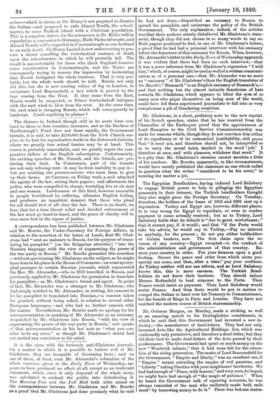A correspondence has been published between Mr. Gladstone and Mr.
Bourke, the Under-Secretary for Foreign Affairs, in relation to the assertion of the latter, at Leeds, that Mr. Glad- stone had "sent an emissary to Russia, for the purpose of trans- lating his pamphlet" [on the Bulgarian atrocities] "into the Russian language, with the view of augmenting the power of the war party in Russia." Mr. Bourke grounded this assertion —without questioning Mr. Gladstone on the subject, as he might have done in his place in the House of Commons—on some apocry- phal passages in certain Russian journals, which represented the Rev. Mr. Alexander,—who in 1876 travelled in Russia, and previously applied to Mr. Gladstone for permission to translate his paraphlet,—as Mr. Gladstone's friend and agent. In point of fact, Mr. Alexander was a stranger to Mr. Gladstone, who had simply notified to Mr. Alexander, in writing, his consent to let his pamphlet be translated into Russian,—a consent taken for granted, without being asked, in relation to several other European languages,—and who had no further concern with the matter. Nevertheless, Mr. Bourke made no apology for his misrepresentation in speaking of Mr. Alexander as an emissary despatched by Mr. Gladstone into Russia, "with the view of augmenting the power of the war party in Russia," and speaks of that misrepresentation in his last note as "what you con- sider to be my error," as though Mr. Gladstone's denial had not carried any conviction to his mind.


































 Previous page
Previous page